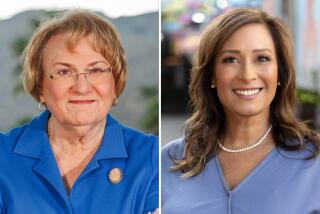Eu Sworn In, Says She’s Running for Senate in ’88
- Share via
SACRAMENTO — Secretary of State March Fong Eu took the oath of office as secretary of state for a fourth term Monday and minutes later became the first major Democratic officeholder to unofficially announce as a candidate for the U.S. Senate next year.
In a speech to about 500 supporters at her inauguration, Eu abruptly sailed into a campaign-style recitation of national and international issues, lashing out indirectly at President Reagan on the Iran- contras scandal and the federal budget deficit, calling for an end to the nuclear arms race and demanding an “all-out effort” to eliminate AIDS.
To sharpen her point, Eu, the state’s first constitutional officer of Asian ancestry, promised to “continue the battle for full and equal rights for women from our board rooms to our courtrooms to our bedrooms.”
“After all, women belong in the House--and in the United States Senate,” she said.
Received Applause
Her partisans, some wearing red and white “Eu in 88” campaign buttons, got the message and responded with three rounds of applause.
Asked by reporters later whether she was unofficially starting a campaign for an office she has long said she wants, Eu replied: “I would call it unofficially letting your friends know what you want to do.”
Other potential Democratic candidates for the seat of Republican Sen. Pete Wilson include Lt. Gov. Leo T. McCarthy and Atty. Gen. John Van de Kamp. Both have indicated an interest in running for the Senate or for governor but have not announced firm plans.
Eu, consistently a top vote-getter among state constitutional officers, said she hopes to raise $2 million in campaign money by July. She said two friends contributed $1,000 each to the fledgling effort on Sunday.
Eu, 64, who was hospitalized in November after being robbed and savagely beaten at her home in Los Angeles’ Hancock Park area by an ax-wielding burglar, declared herself “recovered” and repeated her vow to intensify her fight “as a foot soldier” against crime and drugs.
Appearing fit and jovial, she told reporters that state Treasurer Jesse M. Unruh saw her Monday for the first time since she had been attacked and joked, “ ‘My God, March, you look wonderful. You look better after you’ve been beaten up.’
“I said, ‘Thanks a lot, Jess. You mean I have to go and get beaten up again?’ ”
Eu also joined former Chief Justice Rose Elizabeth Bird in expressing disappointment at the failure of Gov. George Deukmejian to include an Asian on his list of prospective nominees for three vacancies on the California Supreme Court. Bird on Sunday said failure to have an Asian on the high court is “one of the very last barriers we have in the state of California.”
“I really think it would be good if he did nominate an Asian because he has nothing to lose,” Eu said in response to a reporter’s question. “I think it would have been a very important move for him.”
Eu, who last spring called on Bird to abandon her campaign to remain in office, said that by failing to include an Asian as a prospective nominee, Deukmejian had damaged himself politically with Californians of Asian ancestry. Asked how severely he had been hurt, she replied, “Time will tell us how badly.”
Born in Laundry
Eu had urged Deukmejian to appoint a longtime friend, state Court of Appeal Justice Harry Low of San Francisco to the Supreme Court. Low, who shares with Eu the distinction of having been born in the back room of a hand laundry in the San Joaquin Valley town of Oakdale, also was high on the list of various Asian organizations.
In her speech, Eu, like other officials, deplored the high cost of election campaigns and warned that unless Deukmejian and the Legislature enact federal-style limits on contributions, she would lead a drive to put campaign restrictions on the ballot next year.
Candidates for federal office are prohibited from accepting direct contributions from corporations and labor unions but can receive money from political action committees that represent interest groups, including business and labor. Likewise, individual contributors to federal candidates are limited to $1,000 an election.
Eu proposed the same election limits for California candidates, along with a restriction that would prohibit donors from contributing more than $25,000 to all state candidates in a calendar year.
She conceded that the federal law was “not perfect” but said it “is a lot better than nothing--and nothing is what we have in California.”
More to Read
Get the L.A. Times Politics newsletter
Deeply reported insights into legislation, politics and policy from Sacramento, Washington and beyond. In your inbox twice per week.
You may occasionally receive promotional content from the Los Angeles Times.










